Mostrar el registro sencillo del ítem
Assessing decentering: Validation, psychometric properties and clinical usefulness of the Experiences Questionnaire in a Spanish sample
| dc.contributor.author | Soler Ribaudi, Joaquim | |
| dc.contributor.author | Franquesa, Alba | |
| dc.contributor.author | Feliu-Soler, Albert | |
| dc.contributor.author | Cebolla Marti, Ausias | |
| dc.contributor.author | Garcia-Campayo, Javier | |
| dc.contributor.author | Tejedor, Rosa | |
| dc.contributor.author | Demarzo, Marcelo | |
| dc.contributor.author | Baños, Rosa Maria | |
| dc.contributor.author | Pascual, Juan Carlos | |
| dc.contributor.author | Portella, María J. | |
| dc.date.accessioned | 2015-05-13T10:30:30Z | |
| dc.date.available | 2015-05-13T10:30:30Z | |
| dc.date.issued | 2014 | |
| dc.identifier.issn | 0005-7894 | |
| dc.identifier.uri | http://hdl.handle.net/10234/120435 | |
| dc.description.abstract | Decentering is defined as the ability to observe one’s thoughts and feelings in a detached manner. The Experiences Questionnaire (EQ) is a self-report instrument that originally assessed decentering and rumination. The purpose of this study was to evaluate the psychometric properties of the Spanish version of EQ-Decentering and to explore its clinical usefulness. The 11-item EQ-Decentering subscale was translated into Spanish and psychometric properties were examined in a sample of 921 adult individuals, 231 with psychiatric disorders and 690 without. The subsample of nonpsychiatric participants was also split according to their previous meditative experience (meditative participants, n = 341; and nonmeditative participants, n = 349). Additionally, differences among these three subgroups were explored to determine clinical validity of the scale. Finally, EQ-Decentering was administered twice in a group of borderline personality disorder, before and after a 10-week mindfulness intervention. Confirmatory factor analysis indicated acceptable model fit, sbχ2 = 243.8836 (p < .001), CFI = .939, GFI = .936, SRMR = .040, and RMSEA = .06 (.060–.077), and psychometric properties were found to be satisfactory (reliability: Cronbach’s α = .893; convergent validity: r > .46; and divergent validity: r < − .35). The scale detected changes in decentering after a 10-session intervention in mindfulness (t = − 4.692, p < .00001). Differences among groups were significant (F = 134.8, p < .000001), where psychiatric participants showed the lowest scores compared to nonpsychiatric meditative and nonmeditative participants. The Spanish version of the EQ-Decentering is a valid and reliable instrument to assess decentering either in clinical and nonclinical samples. In addition, the findings show that EQ-Decentering seems an adequate outcome instrument to detect changes after mindfulness-based interventions. | ca_CA |
| dc.format.extent | 28 p. | ca_CA |
| dc.format.mimetype | application/pdf | ca_CA |
| dc.language.iso | eng | ca_CA |
| dc.publisher | Elsevier | ca_CA |
| dc.relation.isPartOf | Behavior Therapy, 2014, Vol. 45, n. 6 | ca_CA |
| dc.rights.uri | http://rightsstatements.org/vocab/CNE/1.0/ | * |
| dc.subject | decentering | ca_CA |
| dc.subject | mindfulness | ca_CA |
| dc.subject | metacognitive awareness | ca_CA |
| dc.subject | Experiences Questionnaire | ca_CA |
| dc.title | Assessing decentering: Validation, psychometric properties and clinical usefulness of the Experiences Questionnaire in a Spanish sample | ca_CA |
| dc.type | info:eu-repo/semantics/article | ca_CA |
| dc.identifier.doi | http://dx.doi.org/10.1016/j.beth.2014.05.004 | |
| dc.rights.accessRights | info:eu-repo/semantics/openAccess | ca_CA |
| dc.relation.publisherVersion | http://www.sciencedirect.com/science/article/pii/S000578941400077X | ca_CA |
| dc.type.version | info:eu-repo/semantics/acceptedVersion | ca_CA |
Ficheros en el ítem
Este ítem aparece en la(s) siguiente(s) colección(ones)
-
PSB_Articles [1293]
Articles de publicacions periòdiques







